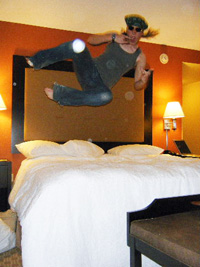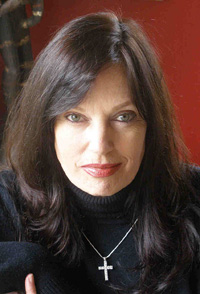Wergle Flomp Humor Poetry Contest 2010
Congratulations to the winners of our 2010 humor poetry contest!
Honorable Mention $75
- Scott Bailey, Greyhound
- James Roderick Burns, Hot Dog and Bun: A Sedoka Duet
- Julian Damanas, Rapunzel
- Lauren Dunlop, A Tale of Two Cutleries
- Corey Ginsberg, Move to Miami
- Richard Hayes, Waxingfat
- Paul Lojeski, Poetry Market
- Leslie McClintock, Living With the Lord
- Will Ross, Things Every Kid Should Know
- Jason Schossler, For Wile E. Coyote, APETITIUS GIGANTICUS
- Jon E. Seaman, It’s a Sign
- Caroline Zarlengo Sposto, Sleeping Beauty — Au Courant
- Susan White, Salvation Drive-Thru
Finalists
- Ryan Baker, T’was the Night Before New Year’s
- Jackie Zollo Brooks, Upon Reading Your Poem
- Diana Chickosky, Ode to a Friend
- Jenny Doughty, Travellers’ Tales
- R.G. Evans, Wordy Harry
- Tanya Grove, A Song for J. Alfred
- Rachel James, A Red Red Bum
- Jessica Kashdan-Brown, Monday’s Child Parody
- Louis Klomp, Rooster Bill
- Andre Levi, On the Succulence of My Lover, as Compared to Prozac
- George Mazzeo, The Grammar Lesson
- Hazra Medica, Ode to a Night in Ale
- Katherine Meyer, The Kitty
- Jay Steingold, Irony Has No Place in Poetry
Thanks to everyone who entered our 2010 Wergle Flomp Poetry Contest. We received over 2,700 entries, a threefold increase over previous years. As Homer Simpson said after he ate 64 slices of American cheese...I think I'm blind.
Unfortunately, more than half of you had no idea that this was a humor poetry contest. I read a lot of misspelled verses about love, self-esteem, dead puppies, sparkly rainbows, and The Meaning of Life.
About 10% of entries made it past the first round of judging. Though I realize these comments are about as likely to be read as the End User License Agreement on your new iPhone apps, I just can't help myself. For the benefit of future generations, here are some of my pet peeves about humor poetry.
Acrostics, Alphabeticals, and Alliteration:
I'm usually bored by poems that use alphabet tricks as their main laugh-getter: e.g., beginning each line with the next letter of the alphabet, or stuffing the poem with every possible word that begins with "M". Humor poems still have to be good poems, sophisticated, well-written, and surprising. Here, the gimmick nearly always drives the poem, sacrificing sense and musicality. The author forgets to add anything else that's funny, and the poem's sole joke quickly becomes predictable. To put it another way, alliteration is not a sufficiently challenging formal constraint to inspire creativity in most of the examples I've seen.
Limericks and Haiku:
Very short forms have a hard time competing against our more substantial entries. I generally don't sense that a lot of thought went into them. Plus, most of the limericks we receive are sloppy about rhyme and meter, which is really the only reason to write a limerick, apart from making fun of people from Nantucket.
Absurd Character Names:
No offense to our august patron Wergle Flomp, but nonsensical names are an initial turn-off for me. It can work, but more often it seems like laziness when a character is called "Betty Dingdong" in order to rhyme with "went to Hong Kong". Rhyme is impressive because it's difficult. Making up words is cheating. (For the record, I don't think "Jabberwocky" is all that funny.) If Betty is going to make more than one appearance in your poem, ask yourself whether her name will still get laughs on the sixth repetition.
I'm in Love With My Car:
We get quite a few love poems with a twist. The narrator declares his or her passion, in terms romantic or salacious, for a beloved who turns out to be a bag of potato chips or a cell phone. These poems simultaneously mock our banal consumerism and the phony melodrama of traditional love poems—both of which are valid points, but the concept isn't fresh anymore, and requires an extra something special to hold my attention. For instance, our 2004 honorable mention poems "Twinkie" by Sarahrae Hill and "O subterranean jewel..." by Kakie Mashburn stood out from others in this genre because they were well-crafted formal poems (a pantoum and a sonnet) and had other humorous features besides the food-romance gimmick.
Happy Hookers:
In my more serious moments, I'm an activist against the exploitation of women in the sex industry. Our culture is full of misguided pundits, songs, videos, jokes, movies, etc., promoting the idea that prostitution is fun and empowering. The reality is usually much more grim. When I read a humor poem about prostitution, I have to think very carefully about whether I will be perpetuating these misconceptions by publishing it. So should you.
Them's Fightin' Words:
Anti-gay slurs not only don't make me laugh, they tempt me to break the sacred seal of contest judging anonymity so I can look up your email address and forward all of my spam to you. Ditto ethnic stereotypes, incest and rape jokes, and violence against women.
This Player's Number Has Been Retired:
If you're going to parody any of these poems—again—it had better be the definitive version. A parody so good that the original author will rise from the grave and bow down to your superior poetic prowess. Otherwise, stay away from:
Robert Frost, "The Road Not Taken" and "Stopping By Woods on a Snowy Evening"
Edgar Allen Poe, "The Raven" and "Annabel Lee"
William Shakespeare, "Shall I compare thee to a summer's day?" and "My mistress' eyes are nothing like the sun"
Allen Ginsberg, "Howl"
Lewis Carroll, "Jabberwocky"
Elizabeth Barrett Browning, "How do I love thee? Let me count the ways"
OUR WINNERS
Surviving multiple rounds of elimination, our first-prize winner, Tabitha Bagatha's "A Frivolous Social Event in the USA", gives a popular Miley Cyrus song an entirely undeserved air of profundity that blossoms into florid obscenity in all the right places. The original, somewhat inane song praises other pop stars whose music makes Miley feel better when she's down—perhaps hoping that listeners will complete the analogy and decide that Miley's music is equally special to them. Bagatha's parody exaggerates this youthful narcissism by paraphrasing the lyrics in loftier language.
A meaningful connection between the original poem and the parody also helped our second- and third-prize winners stand out. Disciplined yet not monotonous use of rhyme and meter pushed them ahead of several honorable mentions that were close contenders for the runner-up prizes, but had more technical rough spots.
Alfred, Lord Tennyson's "The Lady of Shalott" has all the characteristics of a poem ripe for parody. A sentimental tragedy with sing-song rhymes, it was just waiting for Wendy Waters to shed light on the less glamorous side of romance in "The Wife of Lance Allot". In the original poem, a young woman in her cloister weaves magical tapestries from scenes that she is only allowed to view in a mirror, since she is under an enchantment. But when the handsome Lancelot rides by, she defies the curse and looks directly at him, knowing it will mean her death. Like the Lady, Waters's disgruntled housewife finds that she's paid a high price for following romantic illusions, but this time she gets the last word.
Should Michael Jackson run into Samuel Taylor Coleridge in the afterlife, they might bond over their shared interest in mood-altering substances and exotic animals. Benjamin Taylor Lally's "The Ryme of the Old-Time Musique Man" mashes up Coleridge's Ancient Mariner with the legend of the Gloved One, now quickly becoming yesterday's news to a generation that never knew him at his talented peak. Teenagers at the mall stand in for the Wedding Guest, detained by a cautionary tale whose shock value might temporarily pique their interest, but whose relevance they are too naive to understand. Their ignorance of current events is both hilarious and worrisome.
Other poetic freaks of nature that commanded our horrified admiration this year included the creation myth of the spork; a fantasy epic in rhyming couplets that blames Darwin, Marx, and Freud for the collapse of British civilization; an evangelical fast-food joint selling "Sirloin on the Mount"; and a sedoka tribute to hot-dog-eating champ Takeru Kobayashi, who no doubt appreciates the support after his recent fall from grace. Kobayashi, if you'd like to turn your gonzo talents to digesting poems en masse, the 2011 contest is now open for entries through April 1. Help me out here.
Contest Judge

Jendi Reiter
Jendi Reiter is vice president of Winning Writers, editor of The Best Free Literary Contests, and oversees the Winning Writers literary contests. Jendi is the author of the novel Origin Story (Saddle Road Press, 2024), the short story collection An Incomplete List of My Wishes (Sunshot Press, 2018), the novel Two Natures (Saddle Road Press, 2016), the poetry collections Made Man (Little Red Tree Publishing, 2022), Bullies in Love (Little Red Tree Publishing, 2015), and A Talent for Sadness (Turning Point Books, 2003), and the award-winning poetry chapbooks Swallow (Amsterdam Press, 2009) and Barbie at 50 (Cervena Barva Press, 2010). Awards include a Massachusetts Cultural Council Artists' Grant for Poetry, the 2016 New Letters Prize for Fiction, the 2016 Rainbow Award for Best Gay Contemporary Fiction, the 2015 Wag's Revue Poetry Prize, the 2013 Little Red Tree International Poetry Prize, the 2012 Betsy Colquitt Award for Poetry from Descant magazine, the 2011 James Knudsen Editor's Prize in Fiction from Bayou Magazine, the 2011 OSA Enizagam Award for Fiction, the 2010 Anderbo Poetry Prize, and second prize in the 2010 Iowa Review Awards for Fiction. Jendi's work has appeared in Poetry, The New Criterion, Mudfish, Passages North, Cutthroat, Best American Poetry 1990, and many other publications. See their interviews in RoundPier and Lammergeier.
Photo by Ezra Autumn Wilde










